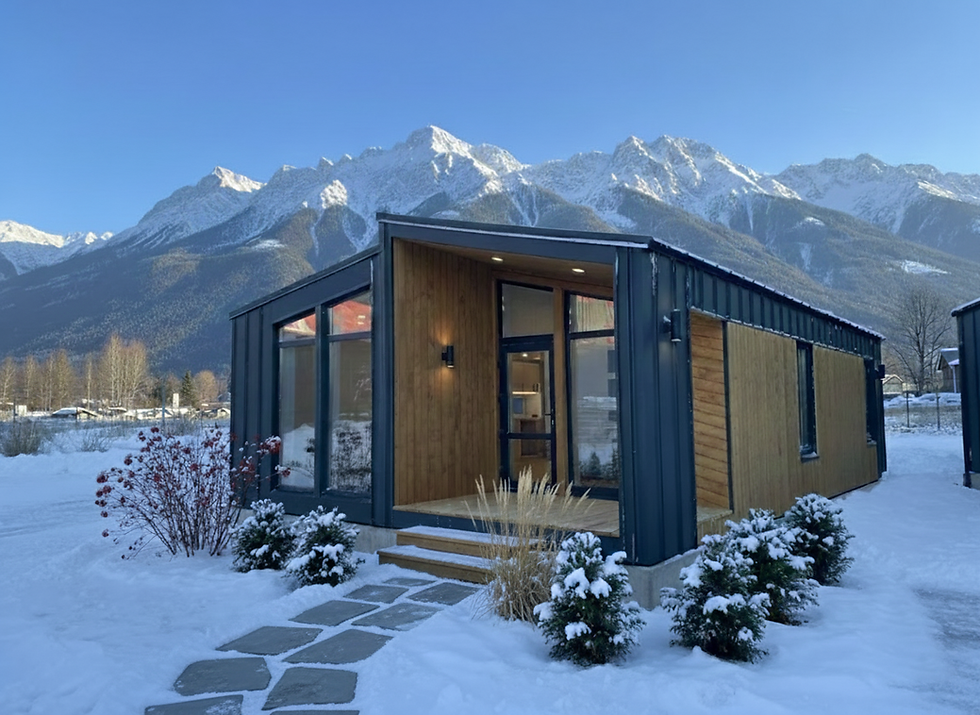Are Modular Homes Legal and Permitted in the UK & EU Countries?
- TICAB Marketing
- Aug 4, 2025
- 3 min read

As modular homes grow in popularity, one of the most important questions prospective homeowners ask is: are these homes legal under planning laws across the UK and EU? This article explains planning permissions, building regulations, and land‑use laws for modular housing in various regions.
What Affects the Need for Planning Permission?
UK 🇬🇧
Planning Permission: Most modular homes require formal planning permission if permanently installed—especially if they exceed 25% of your site area, are within 5 m of a boundary, or are taller than allowable under “permitted development” rules.
Permitted Development Exemptions: Small garden buildings (e.g., office pods or cabins) under ~30 m² and used as ancillary space may qualify as permitted development—but not if used for sleeping or self-contained living.
Mobile vs Permanent Homes: The Measor and Massingham legal cases established that mobile homes not permanently fixed to land are not always classed as buildings and may bypass planning control—though use and permanence are key considerations.
Ireland 🇮🇪
Standard Requirement:
Modular homes are treated as any permanent dwelling and require full planning permission in most cases.
Upcoming Reforms:
Proposals aim to allow detached modular or “granny flat” style homes up to 40–45 m² in gardens without planning permission. These changes are part of broader housing reforms expected in 2025.
EU-Wide 🏛️
Construction Products Regulation (CPR):
Although there’s no EU‑wide standard for prefab houses yet, components (windows, doors, insulation) must carry CE marking when harmonised standards exist.
Building Control Rules:
Member states enforce national building codes based on seven essential requirements (e.g., stability, hygiene, energy performance). Compliance falls under national authority—EU law does not override local criteria.
Regional Highlights: Rules by Country
England & Wales
Planning laws governed under Town and Country Planning Act 1990; building regulations enforced under Building Regulations 2010 and Building Safety Act 2022.
Even temporary modular structures intended to stay longer than 28 days typically need planning consent, unless they fall under permitted development criteria (e.g., small garden offices).
Scotland & Northern Ireland
Planning systems are devolved. Though rules resemble those in England, local constraints (conservation zones, heritage areas) and definitions of permitted development vary. Always consult your local planning authority.
Republic of Ireland
Hosting modular homes requires planning permission in most residential contexts. Only garden structures classified as non‑habitable up to 25 m² currently exempt; reforms may soon raise this to 40–45 m² for detached cabins.
Planning Permission vs Building Regulations
Planning Permission deals with land use, location, size, appearance, and community impact.
Building Regulations Approval ensures structural safety, fire protection, ventilation, and energy standards—regardless of build method.
Modular homes must meet both sets of rules. Even if planning isn't required, building regulations still apply, especially under the updated safety rules effective from 2025 (fire resistance, ventilation, insulation).
🧾 Checklist Summary
Region | Planning Permission Needed? | Common Exemptions |
England/Wales | Yes (unless <30 m² incidental use) | Small garden offices/annexes under PD rights — no self-contained living allowed |
Scotland / NI | Yes (local variation) | Check specific authority guidelines — conservation areas stricter |
Ireland | Yes (most cases) | Only non-habitable garden cabins <25 m² exempt today; reforms may extend to 45 m² |
EU (Rest) | Depends on national rules | CE marking required for components, compliance with national safety standards |
Final Tips Before Building
Always check with your local planning authority (LPA). Engage early with pre‑application advice to assess likely outcomes.
Consult a planning consultant or architect familiar with modular housing in your region.
Ensure your modular home complies with both planning and building regulations, including energy performance, ventilation, and fire safety.
If in Ireland, stay updated about proposed reforms that may expand permitted development exemptions for modular garden pods.
✅ Are Modular Homes Legal: Conclusion
Modular homes can be fully legal and permitted in the UK and across the EU—but understanding local rules is crucial. While temporary or small modular structures may be exempt in some areas, most permanent modular homes require full planning permission and building regulations compliance. Procedural variation means diligent consultation is the key to a smooth approval process.
📞 Thinking about a modular build? Seek local advice and plan accordingly to ensure your modular home is both legal and safe.



Comments